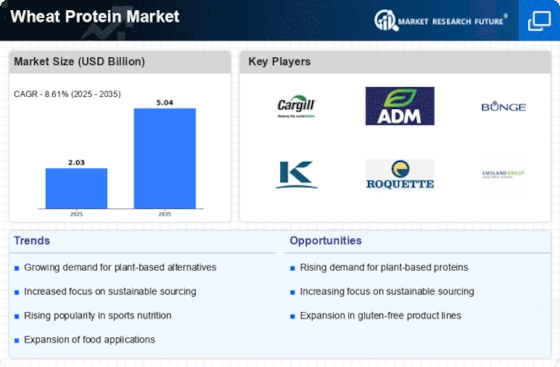Top Industry Leaders in the Wheat Protein Market

The Wheat Protein market, driven by the growing demand for plant-based protein alternatives, has witnessed notable expansion. This analysis provides an in-depth examination of the competitive landscape, encompassing key players, strategies deployed, factors influencing market share, news related to emerging companies, industry trends, current investment patterns, and a noteworthy development in 2023.
Key Players:
Archer Daniels Midland Company (US)
Archer, Incorporated (US)
The Agrana Group (India)
MGP Ingredients, Inc. (US)
The Manildra Group (Australia)
Roquette (France)
Glico Nutrition Co., Ltd. (Japan)
Kröner-Stärke (Germany)
Tereos Syral (France)
Crespel & Deiters (Germany)
Cropenergies (Germany)
Gluten Y Almidones Industriales (México)
Agridient B.V. (Netherlands)
Amilina, AB (Lithuania)
Xi'an Sheerherb Biotechnology Co. (China)
Strategies Adopted:
The Wheat Protein market employ diverse strategies to maintain and enhance their competitive positions. Strategies include product diversification, acquisitions, strategic partnerships, and a focus on research and development. For instance, Archer Daniels Midland Company has been actively investing in the development of novel wheat protein isolates with improved functionalities, aiming to cater to a broader range of applications in the food and beverage industry. Such strategies underscore the commitment to innovation and addressing evolving consumer needs.
Market Share Analysis:
The Wheat Protein market involves evaluating multiple factors influencing competitive positions. Key considerations include the protein content and quality of wheat protein products, pricing strategies, marketing effectiveness, and responsiveness to changing consumer preferences. Companies that effectively balance these factors are better positioned to capture and expand their market share. Additionally, factors such as regulatory compliance, adherence to quality standards, and global distribution capabilities contribute to market differentiation and influence manufacturers' market shares.
News & Emerging Companies:
The Wheat Protein market has witnessed the emergence of new and innovative companies looking to capitalize on the growing demand for plant-based protein sources. In 2023, emerging players such as GreenPro Foods entered the market with a focus on sustainable and organic wheat protein, gaining recognition for their commitment to environmentally responsible sourcing. These newcomers contribute to market diversity, encouraging innovation and potentially disrupting traditional market dynamics.
Industry Trends:
The Wheat Protein market revolve around sustainable sourcing, technological advancements, and expanding applications. Key players are investing in research and development to enhance the extraction process and explore new applications for wheat protein, such as in plant-based meat alternatives and nutritional supplements. Additionally, investments in sustainable and transparent supply chains align with the growing consumer preference for environmentally conscious products.
Current investment trends also highlight the importance of expanding product portfolios and global presence. Companies are strategically acquiring or forming partnerships with regional players to broaden their offerings and strengthen their foothold in key markets. These investments aim to align with evolving dietary trends and diversify applications for wheat protein, contributing to sustained growth in the global Wheat Protein market.
Competitive Scenario:
the Wheat Protein market is characterized by a focus on research and development, sustainable practices, and responsiveness to changing consumer preferences. Companies differentiate themselves through a combination of product innovation, marketing effectiveness, and the ability to address the increasing demand for plant-based protein solutions. The market is influenced by factors such as global distribution capabilities, production efficiency, and the ability to cater to diverse applications in the food and beverage industry.
Recent Development
The Wheat Protein market in 2023 was Cargill's strategic investment in a state-of-the-art wheat protein processing facility. This investment aimed to significantly increase Cargill's production capacity for wheat protein isolates, meeting the rising demand from food manufacturers for high-quality plant-based protein ingredients. The development highlighted the industry's recognition of the need for expanded production capabilities to keep pace with the growing popularity of wheat protein.
Cargill's investment showcased the commitment to meeting the evolving needs of the market by enhancing production infrastructure. The move not only positioned Cargill as a leading player with increased production capacity but also contributed to shaping the Wheat Protein market by setting a standard for advanced manufacturing practices. This development underscored the industry's understanding of the importance of scaling up operations to meet the rising global demand for wheat protein.











